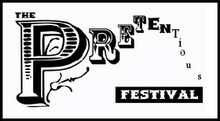 Little can be said about the Stolen Chair Theatre Company aside from: give me back my damn chair! Director Jon Stancato, while infuriatingly mum on the subject of furniture theft, is most articulate on the subject of Commedia Dell'Artemisia, which opens this Sunday, June 17. (The damnedest thing was how comfortable it was... I had the blessed thing for years. It was like a member of the family - a soft, cushiony member of the family that had a few Scotch stains, sure, but that doesn't matter because after all it wasn't for the world but it was mine, dammit, MINE!)
Little can be said about the Stolen Chair Theatre Company aside from: give me back my damn chair! Director Jon Stancato, while infuriatingly mum on the subject of furniture theft, is most articulate on the subject of Commedia Dell'Artemisia, which opens this Sunday, June 17. (The damnedest thing was how comfortable it was... I had the blessed thing for years. It was like a member of the family - a soft, cushiony member of the family that had a few Scotch stains, sure, but that doesn't matter because after all it wasn't for the world but it was mine, dammit, MINE!)What exactly makes your show so damn pretentious anyway?
While we feel that enumerating one's pretensions violates the very spirit of pretentiousness, one must be prepared to make sacrifices for one's art. Our show is pretentious for no fewer than 3 discrete reasons:
1) It is based entirely on obscure 1612 trial transcript for a case of "stupro violento" (violent defloration) that the Carravagioesque painter Orazio Gentileschi brought against the perspective specialist Agostino Tassi in the name of the former's daughter, Artemisia Gentileschi, claimed by art historian Mary Garrard to be the first great female painter.
2) The script is in rhyming couplets fashioned after the style of Jean Baptiste Poquelin (known, to some dullards, only by his stage name, Molière).
3) It is performed in the style of Commedia dell'Arte, the masked Italian professional comedy which descended from the Roman phallophores and was popularized in the 1500s.
Name some obscure influences on your work – extra points for unpronounceability.
Well, in addition to the obvious influences of Artemisia Gentileschi, her first biographer Mary Garrard, JBP Moliere, and his chief English translator Richard Wilbur, our work draws theatrical inspiration from Jacque Lecoq, Antonio Fava, Ariane Mnouchkine, Charles Ludlam, Mel Gordon, Pierre Louis Ducharte, Maurice Sand, Agnes Merlet, and Flaminio Scala, and theoretical inspiration from Judith Butler, Jacques Derrida (of course!), Jan Kott, Katherine Liepe-Levinson, Fredrika H. Jacobs, and John Berger. Our chief influence, however, has always been ourselves.
The late Roland Barthes once wrote "For the theatre one needs long arms; it is better to have them too long than too short. An artiste with shortarms can never, never make a fine gesture." Explicate.
Too many artistes take the current artistic climate at face value, somehow naturalizing the stylistic idiosyncrasies that define it. These short-armed simpletons somehow believe that naturalism is actually natural and that realism is real. Stolen Chair uses its long arms (collectively, our company's arms span approximately 60 feet) to reach deep into the past and around the world to remind ourselves that style is always a choice.
In what ways do you plan on alienating your audience? Cite an intentionally opaque or confusing moment within your production.
In choosing to create a comedy about rape, our project's very mission is alienation. The most confusing moments will not be found on stage, but will instead be found in the psychic drama that each audience member will experience while attempting to reconcile the cognitive dissonance their sick and inappropriate laughter has engendered.
Which other Pretentious Festival show will you declare as your sworn ideological enemy, and why?
We will take on both Hamlets as our ideological enemies as the players' scenes therein bastardize the tradition of Commedia dell'Arte which we are dutifully reconstructing.
Please give us the gist of the acceptance speech you would use were you to win one of our Pretentious Awards.
To accept an award of any sort is to become a slave to the awarding institution's ideology, thereby precluding the Nietzschian re-valuation that all artists must face to embrace their Dionysian power.

No comments:
Post a Comment